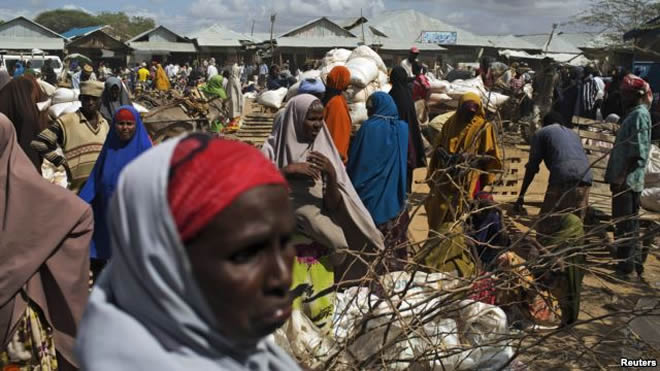
Somali refugees organize their collected ration of food during a distribution exercise outside a United Nations World Food Program center at a refugee settlement in Dadaab, Kenya,

Thursday, April 16, 2015
GENEVA— The United Nations refugee agency says Kenya's plan to forcibly repatriate hundreds of thousands of Somalis from the Dadaab refugee camp would violate international law. The UNHCR is urging the Kenyan government to reconsider its decision to close Dadaab, the world’s largest refugee complex, within the next three months.
The government of Kenya announced its decision to close the Dadaab complex a few days ago, following the horrific attack by Somali militant group al-Shabab at Kenya's Garissa University College.
The U.N. refugee agency says it is shocked and appalled by the attack, which killed 148 students, and understands the seriousness of the threats Kenya is facing.
At the same time, the spokeswoman for the agency, Karin de Gruijl, said Kenya has an obligation to ensure the security not only of its citizens but also of other people living in the country, including refugees.
“UNHCR is nevertheless concerned that abruptly closing the Dadaab refugee camps and forcing them back to Somalia would have extreme humanitarian and practical consequences, and it would be in breach of Kenya’s international obligations," said De Gruijl. "We are thus urging the Kenyan authorities to give the matter further consideration.”
Dadaab is a sprawling complex, composed of five camps in northeastern Kenya. It houses an estimated 350,000 refugees -- mostly Somali women and children. Most of the refugees have been living there for years. Many have been born in the camp and have never been to Somalia.
In December, the UNHCR participated in a pilot project to help Somalis voluntarily repatriate to one of three relatively safe areas of Somalia. De Gruijl said the UNHCR is ready to help those who wish to return home voluntarily.
She added that most of the country is too dangerous for large-scale returns to take place, particularly to south-central Somalia.
She told VOA it would be tough to force so many people to go back at this time.
“It is also very difficult to imagine how such a thing could be organized in a way that it maintains the dignity and the safety of the refugees there," said De Gruijl. "I think the main issue is the voluntariness of returns. As you mentioned, if these people were forced to return, it could be in breach of international law and UNHCR would not facilitate such a move.”
The Kenyan government has called this sprawling complex "a nursery for al-Shabab." De Gruijl said the UNHCR recognizes Kenya’s security concerns and has been working with the authorities to step up law enforcement in the camp and surrounding areas to deter any terrorist incursions from across the border.